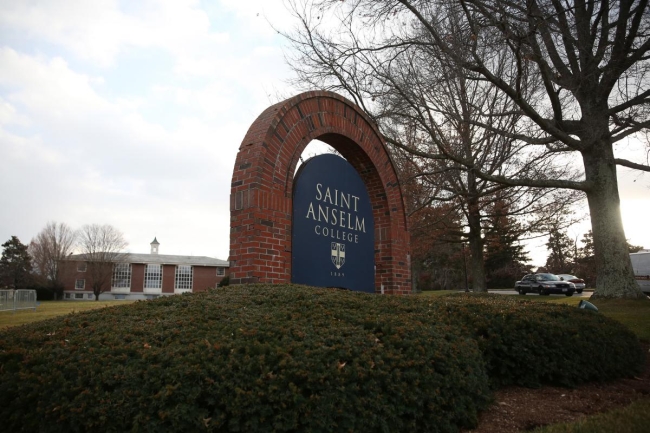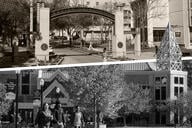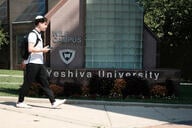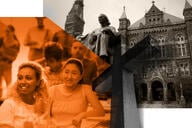You have /5 articles left.
Sign up for a free account or log in.

Andrew Burton/Getty Images
A long-simmering dispute at New Hampshire’s Saint Anselm College over the governing powers held by members of the institution's founding religious order has boiled over into a court battle.
The Benedictine monks of Saint Anselm Abbey are seeking a judicial order blocking the college’s Board of Trustees from amending the institution's bylaws without the consent of the monks. The monks argue that changes proposed by the board would dilute their control over matters of mission and pose "an unreasonable risk of the secularization" of the Roman Catholic college.
Mark Tierney, the attorney for the monks, said what is at stake is the college's future as a Benedictine institution.
"Whether it be 10, 15, 50, 150 years down the road, will the monks be able to guarantee that it is a genuine Catholic college in the Benedictine tradition?" he asked.
College leaders have argued that reforms to its governance structure are needed in order to satisfy accreditation requirements.
Saint Anselm president Joseph Favazza said in a statement that the lawsuit filed by Abbot Mark Cooper and the other monks “follows the breakdown of a collaborative effort by Trustees and the monastic community to resolve some important, longstanding governance issues as Saint Anselm seeks reaccreditation from the New England Council of Higher Education (NECHE), the independent accreditation agency for colleges and universities in all six New England states, including Catholic institutions.”
"The Board of Trustees has made it clear that in no way do they wish to impede the fundamental role of the Catholic, Benedictine mission and traditions of the college," Favazza said. "However, they are committed to meet the NECHE standard which calls for trustees to have sufficient independence to carry out their fiduciary responsibility in the governance of the college. I fully support the Board of Trustees in their efforts to act on behalf of the College to resolve this matter."
The lawsuit is at least the second one in recent months filed by a religious group that argues it has the sole right to amend an affiliated college's bylaws. A regional body of the United Methodist Church filed suit against Southern Methodist University in December after its board amended the bylaws to separate the university from church authority. Southern Methodist's move to sever legal ties with the church came after the Methodist church strengthened prohibitions on performing same-sex marriages and ordaining gay clergy.
‘Sufficient Independence’
Members of the college’s founding religious order maintained complete control over Saint Anselm until relatively recently. According to the lawsuit, a nine-member governing board selected from among the monks governed the college until 2009. The monks amended the bylaws that year, increasing the number of trustees to 40 and limiting the number of monks among the trustees to just seven of the 40. But the monks assert that the 2009 bylaws “reserved several powers to the Monk Members including the power to determine the Catholic and Benedictine mission and identity of the College and to approve any changes to bylaws.”
The New Hampshire Union-Leader, which first reported on the lawsuit, published a nine-page letter from the chair of Saint Anselm’s Board of Trustees, Ann M. Catino, discussing the background of the governance dispute. (A spokesman for Saint Anselm declined to share Catino’s letter with Inside Higher Ed directly, saying the college would “prefer not to share documents that were meant for internal audiences.”)
“By way of background, in 1999, during a reaccreditation review, the accrediting agency demanded clarification in the institution’s governance structure, specifically the roles and responsibilities of and the boundaries between the Abbey, the governing board and the college administration,” Catino wrote. “The accreditation authority required that an appropriate governance structure be developed and defined. This new governance structure was not created for another 10 years, essentially on the eve of the next accreditation visit. It was adopted in 2009 by the Members of Saint Anselm Abbey and the legally required separation of the Abbey from the College occurred.”
"During our 2019 accreditation visit by the NECHE Visiting Team, echoes of issues delayed, unresolved and problematic resounded," Catino wrote. "Issues were clearly identified that required corrective action before our College would be presented to the full NECHE Commission and a final action taken." Catino said the issues are partly "due to growing pains" that come with adapting to a new governance structure, and partly due to what she called "a need to improve our governance structure to align with the accreditation standards that require the Board of Trustees to have 'sufficient independence.'"
Catino added, “The Trustees completely respect the Benedictine importance, presence, and role in our College community, and we have taken many steps to insure it is preserved under the evolving governance structure. But further governance modifications are necessary to meet today’s accreditation standards. While achieving the governance standard published by NECHE has been raised as an issue for decades, it is now at a critical inflection point. And, regrettably, we are at an impasse.”
Saint Anselm remains accredited by NECHE. Barbara E. Brittingham, the president of NECHE, said the agency acted last year to extend Saint Anselm's accreditation, which reflects the finding that the "institution is in substantial compliance" with accreditation standards. However, she said the commission will continue to monitor the institution.
Brittingham said the accreditation standard at issue in the dispute is whether the "institution has sufficient independence from any other entity to be held accountable for meeting the Commission’s Standards for Accreditation."
"If the governing board says it doesn’t have sufficient autonomy, that’s something the commission needs to pay attention to," Brittingham said.
Abbot Cooper, the head of Saint Anselm's abbey and chancellor of the college, said a self-study of the institution done as part of the accreditation process raised concerns that the college’s governance structure “has sometimes caused confusion or revealed ambiguities.” His comments were made in an August letter that was included as an exhibit in the lawsuit.
According to the letter, concerns were raised in the self-study about the powers of the chancellor, the hiring and firing of the president, and "the role of Benedictines at all levels of the college." The study also cited “the lack of a shared understanding of the scope of the [Benedictine] Members’ reserved power regarding changes to the fundamental mission and identity and whether the Board of Trustees possesses ‘sufficient independence that it can act in the College’s best interest.’”
A survey of the board found that 54 percent of trustees “agreed that the board has sufficient independence to ensure that it can act in the College’s best interest” while 38 percent disagreed and 8 percent had no opinion, the letter said. A report by the NECHE visiting team addressed these concerns, stating that there were trustees who felt they could not exercise their "fiduciary responsibilities given the ambiguities regarding the nature and extent of the Members' reserved power."
"It is regrettable that there is not a common understanding of what it means to govern this Catholic college in a Benedictine tradition," Abbot Cooper wrote. "The fact that Trustees do not share the Members' understanding of what it means to govern 'a college of higher education providing a distinctive liberal arts education committed to the teachings of the Roman Catholic Church and to the principles of its Benedictine identity' makes it all the more imperative that the Members not cede control over changes to the College's mission and identity to Trustees who have a different view of the College's identity."
Abbot Cooper also disputed that the NECHE standard about "sufficient independence" is relevant in this instance. He specifically disagreed in his letter with the notion that the Benedictine monks represent an outside entity from which the college would need independence.
"The [Benedictine] Members of the college are members of the College," he wrote. "They are not a separate entity from the College."
Governance Arrangements
It is not uncommon for religious institutions to have separate tiers of governance in which certain powers are reserved for members of the affiliated religious group, while others are handled by a more traditional Board of Trustees.
The Association of Catholic Colleges and Universities (ACCU) published a white paper in 2018 on how institutions structure their governance arrangements. The paper cites an ACCU survey that found that about 44 percent of Catholic colleges operate with a two-tier board structure, comprised of larger lay board and a smaller body closely tied to the sponsoring congregation, with certain core powers reserved for the latter entity.
The survey found that the most common powers reserved for members of the founding congregation include approving changes to the mission, the selection or termination of the president and nominees for the Board of Trustees. In some cases, the founding congregation can also approve the appointment or removal of trustees, the purchase or sale of property, amendments to the bylaws, the dissolution of the college, mergers or consolidations, and debt in excess of a given amount.
Even among Catholic institutions that had one-tier boards, the ACCU survey found that the founding congregation or bishop often reserves certain powers, including over issues of mission, hiring of theology faculty, honorary degree selection, dismissal of the president and the right to call oneself a college in a certain congregational tradition.
Susan D. Phillips, a professor of educational policy and leadership at the State University of New York at Albany and co-editor of Accreditation on the Edge: Challenging Quality Assurance in Higher Education (Johns Hopkins Press, 2018), said accreditors are generally agnostic about the religious aspects of a given institution's governing arrangements.
"What accreditors care about is whether the institution meets its standards, and part of that is a governing body that has enough independence to be able to make good decisions," Phillips said. “Interference with a governing body can happen from lots of sources. I don't see it as a religious issue so much as ‘can the leadership of the institution make the decisions that will be necessary to keep the institution in compliance with the standards?’
"When there's a conflict in the institution but there hasn't been a way to resolve it within the institution, drawing an accreditor into the controversy is a strategy that some will use," Phillips added. "The fact that an institution pointed to [the issue] themselves would suggest that they haven't been able to resolve whatever the issue was internally and the self-study came at a point where it made sense for them to draw on the larger venue in which to have the discussion. It's not a bad venue to have it in, but there's lots of other institutions that I'm sure have had the push and pull, but they've figured out a way to clarify or make it work."




